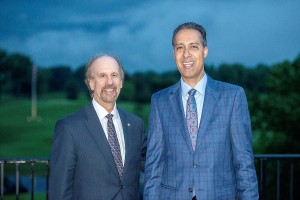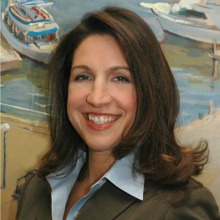WashingtonExec Celebrates Seven Years of Business, Message from CEO
Posted on June 19, 2018, by JD Kathuria, under Featured Interview, News, Uncategorized.
April 26, 2018 marked the seventh anniversary of the founding of WashingtonExec, Inc.
Since its initial website launch and first evening roundtable with Vivek Kundra (the then-Federal CIO), the organization has evolved into 12 mission-focused Councils and a daily digital magazine with more than 20,000 subscribers. In 2011, thanks to the formation of the WashingtonExec Leadership and Emerging Technologies Councils, chaired by Greg Baroni of Attain and Mark Cohn of Unisys Federal Systems, WashingtonExec began to define itself as an executive-level membership organization with a niche in outcome-oriented networking.
Today, the company represents 300 individual executive members and host 100 collaborative roundtables annually. I’ve learned more than I could have ever imagined as a business owner whose job it is to support and interact with thousands of leaders in our local business community. I want to take a moment to thank all of my employees (new and old), members, speakers, sponsors, advertisers and overall well-wishers in the area. As Sid Fuchs says in his book Get off The Bench, “When you need a relationship, it’s too late to build one. The network is powerful and is one of the most valued assets in life. Meet as many people as you can and invest in relationships. You will be amazed at the outcomes.”
Five years ago, I had the idea of providing a one-day STEM (science, technology, engineering and mathematics) Symposium for the National Capital Region. After attending many nation-wide STEM events that included sessions with academics and government professionals, I thought that, with the support of WashingtonExec community partners, we could bridge the gap between parents, kids and the STEM workforce needs of local businesses and governmental agencies.
In 2014, with the guidance of Ed Swallow of The Aerospace Corporation, we launched the first K-12 STEM Symposium in Herndon, Va. On April 14 2018, the 5th Annual K-12 STEM Symposium hosted more than 3,500 parents, kids and teachers, coupled with more than 50 exhibits that included 3D printers, drones, flights simulators, physics experiences, heart monitors, topography models, puzzles and many robotics teams. We look forward to having you and your family March 30 for the 2019 K-12 STEM Symposium.
People often ask me, “What’s next?”.
WashingtonExec continues to build and expand its executive leadership and lifelong networking programs. The WashingtonExec Career Bridge is a unique program that offers professionals a single platform to make connections over the course of an entire career – starting at age 5 with the K-12 STEM Symposium, the College Leadership Program, the Rising Stars of GovCon, career management and executive leadership programs, to exit and retirement.
With WashingtonExec, you join as a member and stay for a lifetime. I look forward to seeing where the market takes us in the next seven years. It will be anything but boring.
No Comments
A Quintessential Example Of Personal Branding Success: Sid Fuchs Becomes First-Time Author Of Mentoring And Networking Book, “Get Off The Bench”
Posted on April 26, 2012, by JD Kathuria, under News.
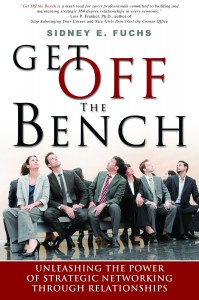 Today marks the one-year anniversary of the formation of WashingtonExec. I have to say, over the past year, I have increased my visits to The Tower Club exponentially….and one person who is synonymous with The Tower Club is Sid Fuchs, Chairman of The Tower Club since 2009.
Today marks the one-year anniversary of the formation of WashingtonExec. I have to say, over the past year, I have increased my visits to The Tower Club exponentially….and one person who is synonymous with The Tower Club is Sid Fuchs, Chairman of The Tower Club since 2009.
Earlier this week, Sid announced the official release of his first book, Get Off the Bench: Unleashing the Power of Strategic Networking Through Relationships.
Sid’s book describes everything that I believe should be quintessential for contracting professionals:
-The value of creating and cultivating a strategic network
-The importance of mentorship at all levels of your career
-How to leverage your relationships
Excerpts from the book were published on WashingtonExec earlier this year.
Sid has kept me in the loop regarding his many stages of publishing this book for a long time. I want to congratulate Sid for finally publishing his “labor of love.”
You can “like” Get Off The Bench on Facebook here.
Join the Get Off The Bench discussion group on LinkedIn here.
Find Get Off The Bench on Twitter here
Find the latest news about Get Off The Bench on Sid’s recently launched website www.sidfuchs.com
Get Off The Bench is now available for pre-order on Amazon.com and Barnes & Noble.com
Get Off The Bench will soon be available for your iPad and Kindle
No Comments
Why Personal Brand Matters
Posted on January 31, 2012, by JD Kathuria, under Featured Interview.
Amid a high unemployment rate and future budget cuts in the federal government, it has perhaps never been more important to have a strong personal brand. In the government contracting sector especially, your reputation is your key asset. Whether you’re looking for a career change or moving up the ranks, you should always work to position yourself for success. And that’s where your personal brand comes into play.
Personal brand? you may ask.
Think of it like this: You’re planning to make a major purchase, one where your credit score matters. Do you wait until the day before your planned purchase to check your score? Of course not. The same goes with your personal brand. Manage it the same way as your credit score: continuously review, improve and recalibrate.
Although everyone has a brand, most don’t know how to manage it. Personal branding is neither marketing or self-promotional; it’s about presenting yourself in the best possible light, whether it’s among your peers, before a potential employer, or the undersecretary at a federal agency. It’s not about the work you have done in the past, but about the work you’re capable of.
Building your brand and raising your reputation capital is simple: Be genuine, stand out, and make others realize it. Figure out what sets you apart. Look at market leaders such as Apple, Coca-Cola and Google — what differentiates them from the competition? Brand promise must be authentic, magnetic and distinctive.
The mistake many do is that they begin working on their personal brand too late; just like it takes time to improve your credit core, fixing a flawed or mismatched brand requires energy and effort. Many also wrongly believe that personal brands are limited to certain professionals. No matter which company you support in government contracting, a strong brand will help you. Just look at John Hillen, CEO and president of Sotera Defense Solutions, who has perhaps the best personal brand of anyone I know. At age 46, Hillen is a war hero, academic, policy wonk, speaker, author and now successful business owner whose brand has not only enabled him to become a well-recognized name, but has also helped him raise money for charities.
Your personal brand, in Hillen’s words, will speak more powerfully than your resume. How you then decide to use your brand is entirely up to you. The sky’s the limit, but get your name out there: And while you’re out there, remember the golden rule of personal branding: It’s not whom you know, but who wants to know you that really counts.
1 Comment
Spotlight On Eileen Cassidy Rivera: The Five Keys To GovCon Corporate Branding
Posted on January 13, 2012, by JD Kathuria, under Featured Interview.
Last month Eileen Cassidy Rivera, former Vice President of Communications and Investor Relations at Vangent, wrote an article in Washington Technology that encompassed my two niches…personal branding and government contracting.
Eileen talked about how valuable company branding is in the world of government contracting…weak-branded companies can get lost in the competition.
Listing the top five ways to guarantee a strong company presence, Eileen believes that simple, straightforward language is one way to win contracts. “A much more compelling way to communicate what a company does differently is to promote the outcomes or results it accomplishes for its customers – in plain English,” said Eileen.
A great idea that Vangent developed was the “brand playbook.” The “brand playbook” was spurred out of a lack of standards for how employees describe their company to potential buyers. I agree with Eileen, making sure the employee understands your company’s offerings matters just as much as how that employee describes what their company represents. Without an understanding of the core mission of the company, your employee is just another person vying for a contract.
Eileen’s third point was that people make business, not companies. Executives should not shy away from bringing a personal or emotional connection to their offerings…how else will potential buyers remember your company?
“The first question asked by any new employee is about the company’s culture, not about the company’s strategy,” said Eileen. She is right, companies spend large amounts of time developing strategy and reading over the “employee handbook” when really, it is the company culture that maintains and retains employees.
Eileen’s fifth and final point is by far the most important message to take away. Government contracting will be going through major transitions within the next couple years…when developing strategies to make a leaner company, cutting out platforms and tools that help promote your company’s brand is just about the worst thing an executive can do.
*Vangent was acquired by General Dynamics September of 2011.
No Comments
The Top Three Ways To Brand Yourself: By Dan Schawbel
Posted on November 21, 2011, by JD Kathuria, under Uncategorized.
 Branding Guru Dan Schawbel recently wrote an article discussing why personal brand is important specifically for small businesses owners.
Branding Guru Dan Schawbel recently wrote an article discussing why personal brand is important specifically for small businesses owners.
I enjoyed his article and I fundamentally agree with his points. Personal branding is often overlooked when starting a business but executives who are neglecting to brand themselves are behind even before they get out of the gate.
It is critical for an executive to create a name not only for his or her business but for themselves. In these uncertain economical times, many businesses are struggling. However, if you have a strong personal brand, your brand can help you become “economy-proof,” (even if your company is not).
The question I get constantly at The Tower Club, “JD, this all sounds great, but how can I actually start to improve my personal brand?” Schawbel offered three simple ways to do this and I decided to highlight them and elaborate.
How To Brand Yourself:
Attract Attention/Find Your Niche – Become an expert in something that relates to your company. This will increase your value; you will become an asset to the company instead of just being another employee. Next time someone needs help or advise with your “expertise” you will be the first in line to offer a solution.
Creating A Personal Website- A great way to test your brand is to Google your name. What comes up? Are you on the first couple titles or are you tucked away buried deep in the 45th page? If you start your own website you can brand yourself throughout your entire career even after you change jobs. Social media is a great free and easy branding tool.
Brand yourself by associating with larger brands- This can mean everything from associating with well-respected companies or creating relationship with well-respected people. Studies show that networking is the number one way to find jobs and more opportunities. The more people you meet the more networking you can do. Never underestimate the power of a smile and a strong handshake.
No Comments
Interview With Networking Guru Devora Zack
Posted on September 1, 2011, by JD Kathuria, under Featured Interview.
 This month I had the pleasure of interviewing Devora Zack, networking extraordinaire and founder of the team management, leadership, and communications consulting firm Only Connect Consulting. I took a more practical approach for our interview, asking Zack what an individual’s next step should be once they receive a business card, and what is a basic concept that most executives do not understand about networking. Much like her book, Networking For People Who Hate Networking Zack brings practical answers to the world of professional connecting.
This month I had the pleasure of interviewing Devora Zack, networking extraordinaire and founder of the team management, leadership, and communications consulting firm Only Connect Consulting. I took a more practical approach for our interview, asking Zack what an individual’s next step should be once they receive a business card, and what is a basic concept that most executives do not understand about networking. Much like her book, Networking For People Who Hate Networking Zack brings practical answers to the world of professional connecting.
What lead you to your current career path?
My career path is quite unusual. I have worked professionally as an actress, disc jockey, and chamber maid – among other things! However, my work now as a leadership development consultant, trainer, and author combines many of of my passions – building connections among people and improving relationships. My MBA in organizational behavior (Cornell), BA in communications and psychology (Penn) and certifications in Neuro-Linguistic Programming and the Myers-Briggs Type Indicator all contribute to my career direction as well.
What is the next step someone should take after they receive that business card at an event?
I’m glad you asked. The very first step takes place right after taking the card. Take a moment to write a few key facts about that person on the front of the card. For example, where you met, their interests, pertinent facts, or how to pronounce their name. This way your follow up is specific and genuine. Follow up within 2 days, while you both still remember each other. There is no point spending your time or money on networking if you don’t follow up. Even following up with one person per event is fine. If you’re not following up, you’re not networking!
What is something most executives do not understand about networking?
Networking done right (i.e. yielding positive, lasting, mutually beneficial relationships) only works when we are authentic. A lot of executives hate the traditional idea of networking because of an erroneous assumption that networking requires being phony, which is draining to most of us. Nothing could be further from the truth. Outcome-driven networking requires being real, which is energizing and puts you in your best light. This also means successful networking strategies differ, based on individual’s personality types. I go into much more detail on this – including a self-assessment – in my book Networking for People Who Hate Networking (Berrett-Koehler 2010).
Is there a difference between networking and connecting?
That is an insightful question! Really…no. When understood and executed correctly, networking is simply about building meaningful connections, one person at a time. The title “Connecting for People Who Hate Connecting” isn’t quite as snappy, though.
How has your profession changed since the explosion of online and social media?
I do a lot of live training seminars. Some organizations have turned to online training because it eliminates travel and expense. However what they lose is person-to-person connection so the value is greatly diluted. I’m still busy!
1 Comment
Todd Stottlemyer: CEO, NonProfit Chairman, Abe Lincoln Admirer
Posted on June 10, 2011, by JD Kathuria, under Featured Interview.
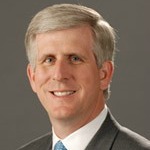 You might already know Todd Stottlemyer as the CEO of Interactive Technology Solutions, or co-founder of Apogen, but did you know he is also a founding member of Helping Children Worldwide? Helping Children Worldwide is a 501 (c) 3 nonprofit founded in 1999 that works with children in Northern Virginia as well as Sierra Leone. Stottlemyer’s involvement in the nonprofit sector is reflective of his belief that teams foster and create change; with every individual there is a team to thank right behind them.
You might already know Todd Stottlemyer as the CEO of Interactive Technology Solutions, or co-founder of Apogen, but did you know he is also a founding member of Helping Children Worldwide? Helping Children Worldwide is a 501 (c) 3 nonprofit founded in 1999 that works with children in Northern Virginia as well as Sierra Leone. Stottlemyer’s involvement in the nonprofit sector is reflective of his belief that teams foster and create change; with every individual there is a team to thank right behind them.
We also talked about personal branding, Stottlemyer named Abe Lincoln as the ultimate “authentic personal brand.” Like the nonprofit sector, Stottlemyer believes that when building professional relationships, you must focus on your connection’s needs. This way you create a sustainable, mutually beneficial relationship.
What is your background?
I am currently the CEO of ITSolutions, a mid-market information technology and management solutions company that serves both government and commercial customers, with a strong focus on the Federal health IT market. We are backed by private equity firm SnowPhipps. Prior to ITSolutions, I co-founded and led Apogen Technologies as Chief Executive Officer. Like ITSolutions, Apogen was also private equity backed by Arlington Capital Partners. In late 2005 Apogen was sold to QinetiQ. I also served as Chief Financial Officer of BTG (now part of L-3) and as a member of the senior executive management team of BDM International (now part of Northrop Grumman). I have also had some very interesting work experiences outside of the technology industry, including serving as President of McGuireWoods Consulting, President and CEO of the National Federation of Independent Business, the nation’s largest business advocacy group, and as an Executive Vice President with the Inova Health System.
No Comments
Anne Altman: Personal Brand Means Helping Your Community
Posted on May 31, 2011, by JD Kathuria, under Featured Interview.
 Despite Anne Altman’s longtime career in the private sector, Altman views her professional life as one dedicated to the public sector. She believes creativity is vital to establishing your brand and growing your company and that innovation is most useful when developed by teamwork and cooperation. Having a large network of business and personal friends not only has helped her in career, but has also provided her with a variety of outlooks and world views. Altman also strongly believes that you must maintain balance between forwarding your career and giving back to your community, as shown by the various her advisory positions in the academic, nonprofit and music sectors.
Despite Anne Altman’s longtime career in the private sector, Altman views her professional life as one dedicated to the public sector. She believes creativity is vital to establishing your brand and growing your company and that innovation is most useful when developed by teamwork and cooperation. Having a large network of business and personal friends not only has helped her in career, but has also provided her with a variety of outlooks and world views. Altman also strongly believes that you must maintain balance between forwarding your career and giving back to your community, as shown by the various her advisory positions in the academic, nonprofit and music sectors.
What’s your current role at IBM?
I currently serve as General Manager of IBM’s Global Public Sector. In this role I’m responsible for the strategy, direction, and development of solutions for public sector clients worldwide spanning federal and state and local government, education, health care, life sciences and pharmaceutical industries. I work with a team of more than 7,000 technology, research and consulting services practitioners globally who are playing a key role in IBM’s internationally recognized smarter planet campaign.
How would you describe your personal brand?
Passionate and dedicated to the Public Sector. I joined IBM in 1981 as a systems engineer supporting the Federal Bureau of Investigation and then went on to many other roles within IBM – with the exception of a few, all in the public sector. I’ve been privileged to have worked in re-establishing IBM’s position in the Federal market, and now combining health care, life sciences and education industries to my government portfolio in a global capacity. In my IBM career, while many things have changed – there’s been one constant – namely, helping clients leverage hardware and software technologies, research and deep expertise to improve their operations and deliver quality services their respective constituents.
No Comments
Stu Shea: Advice From A College Professor, How To Expand Your Network, And The Social Media Community
Posted on May 23, 2011, by JD Kathuria, under Featured Interview.
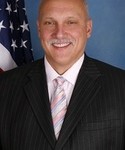 Stu Shea, founder of the non-profit USGIF, gives a thoughtful and informative interview about personal branding, social media, and how the best piece of advice he has ever received was from his college thesis professor.
Stu Shea, founder of the non-profit USGIF, gives a thoughtful and informative interview about personal branding, social media, and how the best piece of advice he has ever received was from his college thesis professor.
Shea believes that an emphasis on community team building and that the wisdom of crowds sparks business innovation, social media is one way to start the discussion. Regarding personal brand, Shea suggests that most executives relay on a narrow set of skills to get through life, instead of engaging with a variety of people and outlets.
No Comments
Career Transition Coach Stan Krejci: How To Have A Successful Interview
Posted on May 18, 2011, by JD Kathuria, under Featured Interview.
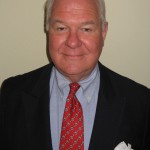 Stan Krejci, founder of the career and transition consulting company SK Group LLC, talks about how to have a great interview and why even start-up companies need a board of advisors.
Stan Krejci, founder of the career and transition consulting company SK Group LLC, talks about how to have a great interview and why even start-up companies need a board of advisors.
